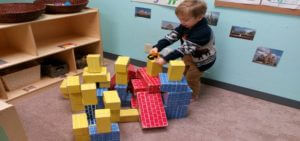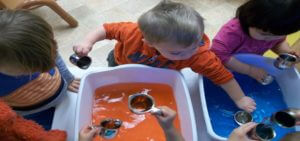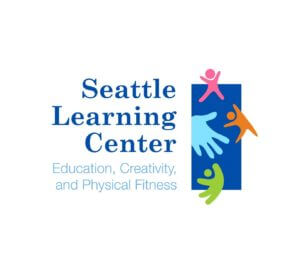We believe that early childhood educators are not only nurturers. They are partners, facilitators, observers, and co-learners who have a deep understanding of developmentally appropriate practice. Our program is, at its heart, child-centered. We have basic trust in the child to be an initiator and an explorer eager to learn what he is ready for. Because of this trust, we provide the child with only enough help necessary to allow the child to enjoy mastery of her own actions. During care activities (diapering, eating, dressing, etc.), we encourage all children to become an active participant rather than a passive recipient of the activities.

Block Play at Seattle Learning Center
We prepare our children to succeed in school by creating an environment that fosters confidence, curiosity, intentionality, self-control, relatedness, capacity to communicate, and cooperativeness. We believe that school success requires understanding of other people’s feelings and viewpoints, cooperating with adults and peers, emotional self-control, and the ability to resolve conflicts constructively. This social and emotional school readiness is critical to successful kindergarten transition and success in the early grades.
We give children plenty of time for uninterrupted play, giving them the freedom to explore. Instead of trying to teach children new skills, we appreciate and admire what they are actually doing. Our emergent curriculum encourages the use of creativity and flexibility in the creation of lessons plans and reflect the current interests of the children. The selection of the topic is based on observations and discussions with the children and between teachers.

Sensory play at Seattle Learning Center
The educator watches, listens and reflects on what is happening in order to reinforce the child’s learning and appreciation of an experience. We build on their interests by providing an environment that promotes learning experiences and by asking open-ended questions in play. This approach supports child development because educators understand individual differences and arrange their room so that children can explore at their own pace. We make available a wide range of materials and activities in order to allow children to make their own choices. We work hard to match the curriculum to the strengths and interests demonstrated in the children.
We have time and time again been impressed by the skills these children learn when teachers set up the right environment, gives a child uninterrupted play, trusts the child and their ability to learn, and takes the time to observe and truly understand each individual child.

“Childhood is not a race to see how quickly a child can read, write, and count. It is a small window of time to learn and develop at the pace that is right for the individual child. Earlier is not better.” Magda Gerber
Social Intelligence (referenced on home page)
“Hey Parents, Leave Those Kids Alone”
Risk is Essential to Childhood
Raising an Emotionally Intelligent ChildLove and Logic
How Can Exercise Improve Learning?
How to Choose the Right Kindergarten School
Brain Rules for Baby by John Medina Book Summary
The Hurried Child
Miseducation- Preschoolers at Risk- Book Review
Caring for Infants with Respect
Stress Management- How to Become Calm
